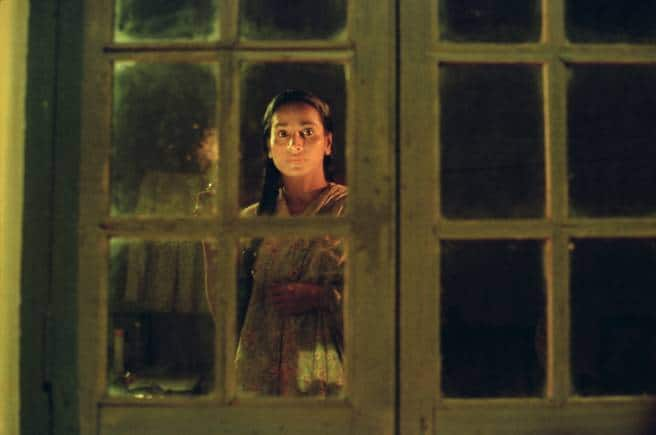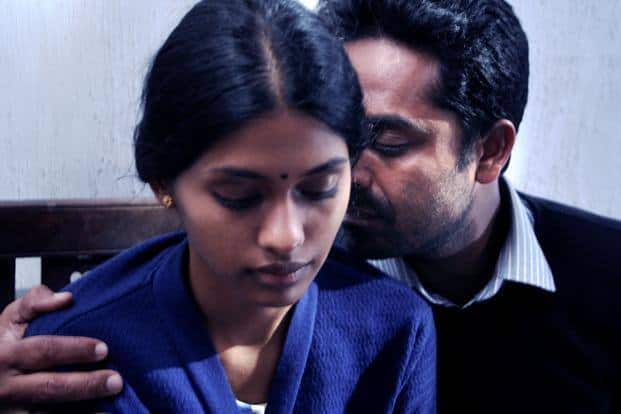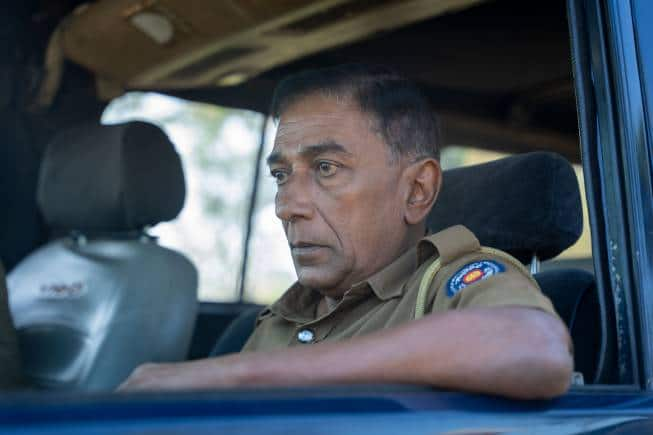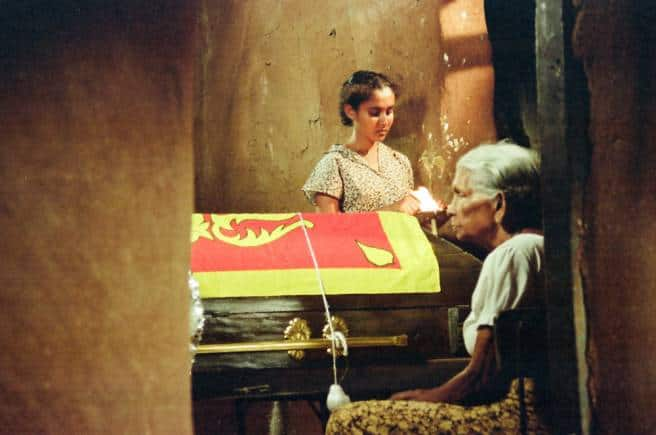



Squid Games finds a mention in Paradise but that is not why South Korea’s Busan International Film Festival gave it the prestigious Kim Jiseok Award, for the Best Film, last month. Over the last three decades, Sinhala filmmaker Prasanna Vithanage has been consistently filming the Sri Lankan conundrum, his gaze turned inwards, on to human relationships. The crux of Vithanage’s Paradise and his drive to tell the story of Sri Lanka lies in John Milton’s poem Paradise Lost (1667), “…for now the thought/Both of lost happiness and lasting pain/Torments him.”
His latest outing, however, is in the Malayalam language (his first Indian-language film), with Malayalee actors. The quiet gravitas and dependability of Darshana Rajendran and Roshan Mathew offer directors the chance to push the envelope. If Roshan makes the macho soft, Darshana makes the soft land punches (Jaya Jaya Jaya Jaya Hey; Purusha Pretham). Both have presented a smorgasbord of roles, the good, the evil and the indifferent. The story of a blinkered man and his curious wife, Paradise opens with a sweet, young, still-in-love Indian couple visiting Sri Lanka on their fifth anniversary, it builds the momentum and ends with a stupefying Rajendran moment. That penultimate scene will live rent-free in the viewer’s psyche.
The film, which screened at Jio MAMI Mumbai Film Festival and shows at Dharamshala International Film Festival this week, is produced by the Massachusetts, the US-based “fairly young” Newton Cinema (founded in 2020), which backs select talented filmmakers and steers films that can serve as catalysts for positive social change,” says producer and CEO Anto Chittilappilly, adding, “after viewing the post-production of Paradise, we were thrilled when Mr Mani Ratnam, along with his Madras Talkies, wanted to present and promote our film.”
Edited excerpts from an interview with Vithanage, 61:
Is Paradise your second outing with Malayalee cinematographer Rajeev Ravi (Dev. D, Gangs of Wasseypur, Bombay Velvet, Thuramukham)?Rajeev and I first worked on my previous film, Gaadi (Children of the Sun, 2019). Rajeev always brings in a new perspective to my work. And he loves Sri Lanka, he sees it as a Kerala from 20 years ago, that what is getting lost in Cochin, as buildings have encroached on nature.
 A still from Gaadi (Children of the Sun, 2019).You love coming to India. Tell us about the Indian films you grew up on.
A still from Gaadi (Children of the Sun, 2019).You love coming to India. Tell us about the Indian films you grew up on.My father used to take me to watch Hindi films and Tamil movies. His favourite actor was Dilip Kumar and I remember watching Raj Kapoor’s Sangam (1964). Indian cinema has been a predominant inspiration for me. I watched the DVDs of Guru Dutt and Bimal Roy films. When All India Radio didn’t allow film songs to be aired from India, Sunil Dutt, working in Radio Ceylon, made Hindi film songs very popular among Sri Lankans.
I wanted to join Pune’s Film and Television Institute of India, but I didn’t know how. I joined the Sri Lankan film industry as a writer first, then became a filmmaker. I came to India to edit my second film Anantha Rathriya (1996) at Chennai’s Gemini Labs, where I met (film editor) Sreekar Prasad and have worked with him since 1997. Making an Indian language film is the highest achievement of my life, not the award (2023 Kim Jiseok winner at Busan International Film Festival).
But why in Malayalam and not Tamil, which is spoken in Sri Lanka?The Indian Tamils and local Tamils make up about 15 per cent of Sri Lanka’s population and the Muslims in Sri Lanka speak Tamil. While I thought the characters should come from south India, I know many friends who are from Kerala and have joined the Bollywood industry in Mumbai, so I got insights which I needed for my characters. Keshav’s life’s motive comes from his profession. Luckily, the actors could switch between Malayalam and Hindi.
 A still from Paradise.Darshana Rajendran and Roshan Matthew are a surprise package. Darshana, in her quiet resilience, is astounding. How did you stumble upon them?
A still from Paradise.Darshana Rajendran and Roshan Matthew are a surprise package. Darshana, in her quiet resilience, is astounding. How did you stumble upon them?I have seen Roshan’s performance in a few Malayalam films, C U Soon and Kappela in 2020. The character Keshav is young, not yet (financially) settled in life, he had the kind of physical attributes I was looking for in the character. Keshav means Krishna, he’s kind of a lovable person also. Through Malayalam filmmaker Geethu Mohandas, wife of Rajeev Ravi, I met Roshan in Cochin and found him to be highly sensitive. He came with a notebook and I had my notes. Our observations about the character were similar.
Amrita is a lady who has not settled professionally, maybe she had ambitions to become a novelist or a journalist, but now she is a blogger and dependent on her husband. She could be extremely pretty but she should have that independent quality in her. That I saw in Darshana. I enjoyed working with both of them because both come from theatre background and they brought emotional truth to their parts, in the way they bring out the beats between Keshav and Amrita. Good actors enrich the director’s vision.
 Anantha Rathriya (Dark Night of the Soul, 1996), based on Tolstoy’s 1899 Resurrection (1899).Tell us about your theatre to cinema transition and adapting literature into films.
Anantha Rathriya (Dark Night of the Soul, 1996), based on Tolstoy’s 1899 Resurrection (1899).Tell us about your theatre to cinema transition and adapting literature into films.From the start, I wanted to be a filmmaker. (Soviet theatre practitioner Konstantin) Stanislavski’s My Life in Art (1924) inspired me to get into theatre before films. I translated plays first. Then I translated and directed (George) Bernard Shaw’s Arms and the Man (in 1986) and Dario Fo’s Trumpets and Raspberries (in 1991), among others. My biggest questions as a filmmaker was where to put the camera and how to talk to actors, what to say and what not to say, to get a good performance. In theatre, I learnt how to work with actors. In both theatre and cinema, you have to aim for the truth, emotional truth, what the character is undergoing in that moment. That is the key between me and the actor. Stanislavski says, whatever the genre or style you adapt, it should be truthful.
As the only child of government-servant parents, I was left with a lot of books. When I was 14-15 years old, I’d read most of the 19th century Russian literature. I have an emotional closeness to it. Two writers I’ve adapted into cinema are Leo Tolstoy (in Anantha Rathriya) and Fyodor Dostoevsky (in With You, Without You). The latter is about a man living unredeemed with a guilt, unable to express his love for a girl, because he feels, for a man, expressing true feelings is not a male quality. Making With You, Without You was a metaphor for my country. It is the tragedy of the inability to reconcile. We have been unable to see each other from their point of view.
 Indian actor Anjali Patil and Sri Lankan actor Shyam Fernando in Oba Nathuwa, Oba Ekka (With You, Without You), based on Dostoevsky’s Krotkaya (The Meek One, 1876).And the reason for making Paradise?
Indian actor Anjali Patil and Sri Lankan actor Shyam Fernando in Oba Nathuwa, Oba Ekka (With You, Without You), based on Dostoevsky’s Krotkaya (The Meek One, 1876).And the reason for making Paradise?In 2022, it was chaos in Sri Lanka. From this chaos, I have tried, as a filmmaker, to say something about human relationships. It is a sword with two sharp edges. For me, it was more about the anger against the ruling Rajapaksa family, the widening rich-poor gap, and people coming out on the streets after a very long time. Earlier, the Sri Lankan middle class was indifferent, but things changed overnight. It means, the tension was there underneath and it erupted. I thought how could I talk about Sri Lanka and humanity and not probe myself. The male psyche of Keshav comes from me. Being a male, you have power, in a marriage, etc. So, how to question the power balance. Paradise is about probing the male psyche, including me and the country. Cinema makes you accept certain things that you don’t accept in real life.
 A still from Paradise.Please talk about layering the man-woman relationship with the Ramayana. In your modern-day take, as the paradise turns into a willing exile, Amrita’s Sita is quietly, and subconsciously, vanquishing the evil that is ego, seen in all men, in Rama and Ravana, and Keshav is both. The mythology, with its 300 versions, is a delicate subject for both the countries.
A still from Paradise.Please talk about layering the man-woman relationship with the Ramayana. In your modern-day take, as the paradise turns into a willing exile, Amrita’s Sita is quietly, and subconsciously, vanquishing the evil that is ego, seen in all men, in Rama and Ravana, and Keshav is both. The mythology, with its 300 versions, is a delicate subject for both the countries.That’s a good interpretation. I leave it to the audience. If you check YouTube, you’ll see Ramayana tours are organised in Sri Lanka. Many Indian tourists come to visit these sacred places mentioned in the epic. Like the travel guide in the film Andrew (Shyam Fernando) says, as well as a recent skirmish between two MPs in the Parliament, over the question: whose side Ravana belongs to, Tamil or Sinhala? For us, it’s mythology, for some, it’s history, for yet others, it’s a belief that he was the greatest king and he was innocent, that he abducted Sita because his sister (Surpanakha) was attacked (by Lakshman). All these stories are there. I have read the Ramayana in a few versions. Both Kamban’s Ramayana and Valmiki’s. I also got inspiration from AK Ramanujan’s (Three Hundred Rāmāyaṇas). It’s a practical thing, how these people interpret it in their own way. It’s not a single narrative. Though some people, some politicians, wherever they are from, whether Sri Lanka or India, will say there’s only one narrative, but there are many narratives. I didn’t try to play safe, what I tried to show was how it affects one’s character. To bring out Amrita’s latent attitude. She uses this tale to say something about women in front of Keshav.
 Sri Lankan actor Shyam Fernando and Mathew in Paradise.Tell us about living through the recent economic crisis, the condition of Tamil estate workers, and grasping at tourism straws. All of these make up your film’s backdrop.
Sri Lankan actor Shyam Fernando and Mathew in Paradise.Tell us about living through the recent economic crisis, the condition of Tamil estate workers, and grasping at tourism straws. All of these make up your film’s backdrop.In the film, the story happens in June, the struggle erupted after March 31, the queues for gas cylinders and situation was bad then. By April-June, tourists were coming into Sri Lanka. Even the upper middle class came on to the streets. When there’s a gas shortage, it affects all people, all classes. A Tamil politician told me that the Tamilians in the country’s north and east said, it’s bad but we’ve lived under worse situations before, during the war. In estates also, the struggle has been really bad, to collect 20 kg of tea leaves to have $3 per day. All the government coffers, foreign exchange were empty. So, to get fuel, India gave humanitarian aid plus a huge loan ($376.9 million). The government urged tourists to visit Sri Lanka. Those from the south (India) came because Indian rupee was higher compared to Sri Lankan rupee (Indian Re 1 equalled Sri Lankan Rs 4). As Keshav says in Paradise, these people are in need of dollars so we are doing them a favour. There is a truth in it.
You grew up during the Civil War, as a young person then you’d have held certain sentiments and biases. As a filmmaker, how did you break free of the shackles of history and your own emotions?Yes, thank you for asking that question. I have grown up with the war and have accepted that fact. We have heard stories in the state-controlled media in Jaffna. But before that, there is a history for it. The whole situation erupted because the majority Sinhalese (74.9 per cent) and the minorities couldn’t come to an agreement on how to share power. In the beginning, the Tamilians tried a Gandhian Satyagraha and Ahimsa movement but felt they have been marginalised and oppressed by the majoritarian government. In 1983, I was 21 years old. In my hometown, all the pharmacies and groceries owned by the Tamilians were looted. People were killed, petrol bombs thrown. The country was in flames. It further polarised the Sinhalese and Tamils. Then started the guerrilla war, which became the protracted war. The LTTE (Liberation Tigers of Tamil Eelam) became the de facto state. A few politicians have tried to bring sanity, seeking provincial councils for power-sharing, like it is in India. But the Thirteenth Amendment (to the Constitution) has still not been implemented. There’s no reconciliation and even the Buddhist monks, I’m ashamed to say, have added fuel to racial hatred. After the war, there was no Tamil enemy, so the Sinhalese politicians created another enemy: Muslims.
As an artist, if I’m not objective, it’s not art. There is an objective truth to art. After seeing the film, the point on which you and I could agree becomes the objective truth. As a person, I saw a lot of violence on both sides, but I couldn’t do anything. (Indian free thinker) Jiddu Krishnamurti said, the quest for nationality polarises people, it ends up in violence. Anything that polarises people is evil. Because I can’t bring the carnage to an end, I must contribute in some way before I die, it may be a selfish thing, but to feel that this work (films) would bring some meaning to my life.
 A still from Akasa Kusum.It strikes me that you made Akasa Kusum (Flowers in the Sky, 2008) and Mrinal Sen made Akash Kusum (1965).
A still from Akasa Kusum.It strikes me that you made Akasa Kusum (Flowers in the Sky, 2008) and Mrinal Sen made Akash Kusum (1965).Mrinal da is the first great film personality I was lucky to meet face to face, at his home, and he said, welcome to my pigeonhole. Geeta (Sen’s wife) madam treated us with coconut soufflé. In 1996, I had gone to Calcutta for the screening of Anantha Rathriya at Cine Central festival, at the now-defunct Lighthouse Cinema. Mrinal da watched my film and wrote me a note about its sensitivity, I still keep it with me. I’d seen Akaler Sandhane (1981) and Kandhar (1984) by then but I saw Bhuvan Shome (1969) later. Our films are not similar; the titles are coincidental.
You’re considered the pioneer of the third generation of Sri Lankan cinema. Can you talk about the first two generations?On January 21, 1947, the first Sri Lankan/Sinhala film (Kadawunu Poronduwa) was released, though Sri Lanka got independence in 1948. The film was more like a photograph theatre, and the people, the way they behaved, the dress code, everything was south Indian. They shot the films inside Madurai and Chennai studios. In 1956, came Rekava, by Lester James Peries, who’s considered parallel to Satyajit Ray. Like Ray, he was also inspired by Italian neorealist films. He established the cinematic language in Sri Lanka. The second generation belongs to the young rebels who came after the first insurgency in Sri Lanka in 1971, like Naxalism emerged in Bengal. In 1973, Dharmasena Pathiraja made his first film, Ahas Gauwa (One League of Sky). He, and later, Vasantha Obeysekera, brought out the issues of youth (joblessness; meaninglessness of life; lost hope for independence) at the time, indirectly addressing the reasons that led to an insurrection. That time was like that song from Guru Dutt’s Pyaasa (1957), Yeh duniya agar mil bhi jaaye…Let the country burn. Then came my generation with Anantha Rathriya. We showed life with the civil war, with ethnic polarisation, and the need to question the government.
 Sri Lankan actor Mahendra Perera as Sergeant Bandara in Paradise.You have battled censorship vociferously.
Sri Lankan actor Mahendra Perera as Sergeant Bandara in Paradise.You have battled censorship vociferously.After Death on a Full Moon Day (1997) was cleared by the Public Performance Board, the minister banned it. So, I filed a fundamental rights case, it was a one-year legal battle, and finally the Supreme Court of Sri Lanka decided the film should be released. It ran for more than 75 days. I’ve been very vocal about what’s happening in my country.
 A still from Vithanage’s Death on a Full Moon Day (1997).How did you come to co-produce the recently released Bhagwan Bharose?
A still from Vithanage’s Death on a Full Moon Day (1997).How did you come to co-produce the recently released Bhagwan Bharose?In 2012, when I screened With You, Without You at IFFI (International Film Festival of India), Shiladitya Bora (Bhagwan Bharose director) was the first to get my film a theatrical release, all the other times, it was screened at festivals. Bora invited me to join as a co-producer. The subject was close to me, about losing one’s innocence because of hate politics. I tried to help him with post-production in Kolkata.
 A still from Shiladitya Bora’s film ‘Bhagwan Bharose’ (2023).There was a time when the SAARC (South Asian Association for Regional Cooperation) nations worked together. How do you see cultural exchanges in a post-SAARC world?
A still from Shiladitya Bora’s film ‘Bhagwan Bharose’ (2023).There was a time when the SAARC (South Asian Association for Regional Cooperation) nations worked together. How do you see cultural exchanges in a post-SAARC world?There should be more collaboration, more cooperation between the South Asian countries. Because of the current political situation, it won’t be easy, like the European Union. We feel very sad about it. In South Asian events, we sometimes exclude one party, one country because of the politics. I met many filmmakers from the region (Bangladesh, India and Pakistan) in Busan (South Korea) and realised they have common issues, related to funding and distribution. Busan’s Asian Project Market helps. I used to come to Delhi (at India International Centre), where Aruna Vasudev organised SAARC region film festival (founder of erstwhile Osian Cinefan Asian and Arab film festival; she received the Lifetime Achievement award at 2023 Jio MAMI Mumbai Film Festival). We should all work towards protecting the shrinking cultural space. That’s why when I’m invited to the smallest film festivals in Tamil Nadu for instance, I go and encourage, to have a dialogue.
Discover the latest Business News, Sensex, and Nifty updates. Obtain Personal Finance insights, tax queries, and expert opinions on Moneycontrol or download the Moneycontrol App to stay updated!
Find the best of Al News in one place, specially curated for you every weekend.
Stay on top of the latest tech trends and biggest startup news.